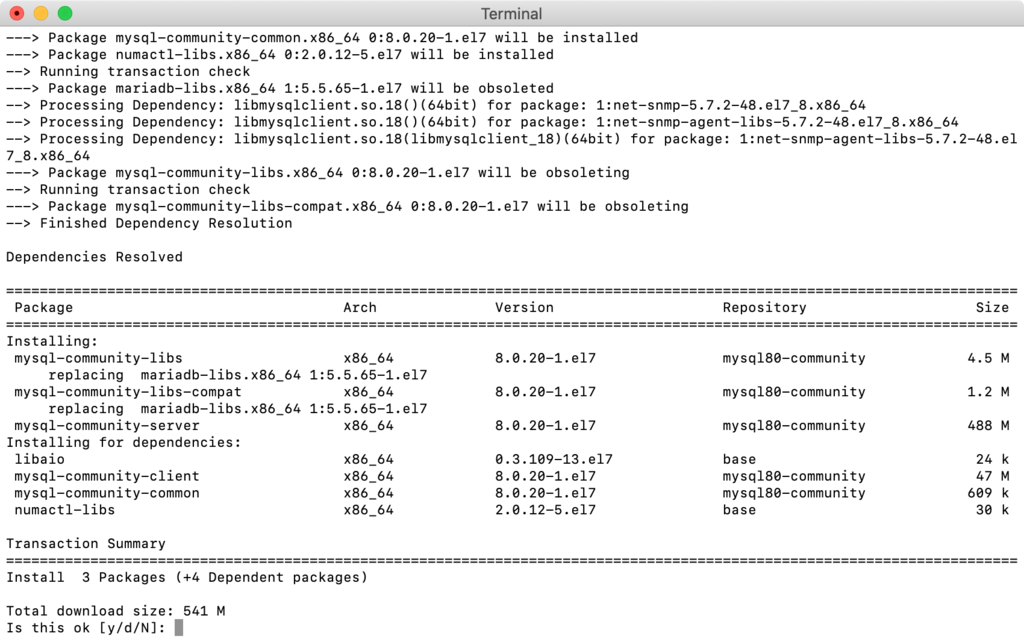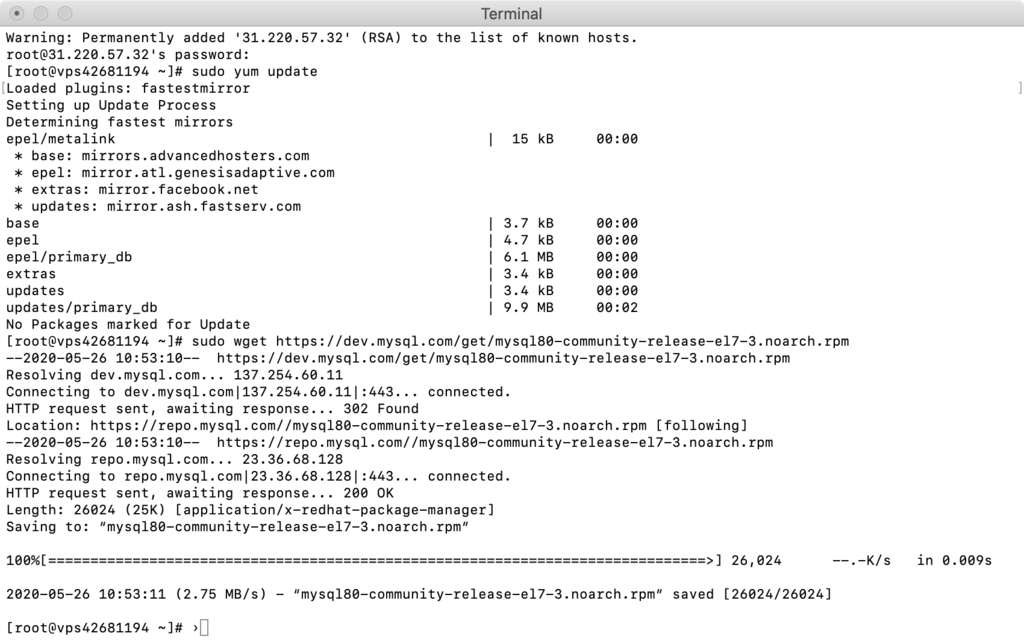

- Centos 7 install mysql 5.5 client cli update#
- Centos 7 install mysql 5.5 client cli upgrade#
- Centos 7 install mysql 5.5 client cli software#
- Centos 7 install mysql 5.5 client cli free#
The Remote Authentication Dial In User Service (RADIUS) is a protocol for user authentication over networks. You can check this by issuing the following command: $ cat /usr/lib/firewalld/services/radius.xml

We’ll configure firewalld to allow radius and httpd packets. Configure CentOS 7 Firewall for freeRADIUS Hint: Some lines were ellipsized, use -l to show in full. May 04 15:28:42 dracula_backup systemd: Started FreeRADIUS high performance RADIUS. May 04 15:28:42 dracula_backup systemd: Starting FreeRADIUS high performance RADIUS. Loaded: loaded (/usr/lib/systemd/system/rvice enabled vendor preset: disabled)Īctive: active (running) since Sat 15:28:42 UTC 1min 8s ago rvice - FreeRADIUS high performance RADIUS server.Output for enable rvice: Created symlink from /etc/systemd/system//rvice to /usr/lib/systemd/system/rvice.Ĭheck the status of rvice: $ systemctl status rvice With the following line we’ll install freeradius, freeradius-utils, freeradius-mysql and freeradius-perl: $ sudo yum -y install freeradius freeradius-utils freeradius-mysql freeradius-perlĪfter the installation’s finished, start and enable freeRADIUS so it’s running and so it also starts up on boot: $ systemctl start rvice
Centos 7 install mysql 5.5 client cli free#
freeradius.x86_64 : High-performance and highly configurable free RADIUS server Looking through the output we can see the packages we want to install are available so we can go through with the installation. Radcli.x86_64 : RADIUS protocol client library Pam_radius.x86_64 : PAM Module for RADIUS Authentication Radcli-compat-devel.x86_64 : Development files for compatibility with radiusclient-ng and freeradius-client = Matched: freeradius =įreeradius-devel.i686 : FreeRADIUS development filesįreeradius-devel.x86_64 : FreeRADIUS development filesįreeradius-doc.x86_64 : FreeRADIUS documentationįreeradius-krb5.x86_64 : Kerberos 5 support for freeradiusįreeradius-ldap.x86_64 : LDAP support for freeradiusįreeradius-mysql.x86_64 : MySQL support for freeradiusįreeradius-perl.x86_64 : Perl support for freeradiusįreeradius-postgresql.x86_64 : Postgresql support for freeradiusįreeradius-python.x86_64 : Python support for freeradiusįreeradius-sqlite.x86_64 : SQLite support for freeradiusįreeradius-unixODBC.x86_64 : Unix ODBC support for freeradiusįreeradius-utils.x86_64 : FreeRADIUS utilitiesįreeradius.x86_64 : High-performance and highly configurable free RADIUS server Loading mirror speeds from cached hostfile The output should look something like this: Loaded plugins: fastestmirror With the following line we’ll perform a quick search for all the available freeRADIUS packages, to make sure they’re available: $ sudo yum search all freeradius We normally can install the above mentioned packages from the CentOS YUM repository. We want to install the following packages:
Centos 7 install mysql 5.5 client cli update#
Run the following command to update the system’s package index: $ sudo yum -y update Step 1 – Install FreeRADIUS & Additional Modules on CentOS 7 Moving forward, we’ll install FreeRADIUS along with daloRADIUS on a machine running a fresh installation of CentOS 7. Prefer to do it yourself? Then this is the way to go. We're available for hire, if you need help. To order, proceed to our FreeRADIUS VPS Plans.
Centos 7 install mysql 5.5 client cli upgrade#
As mentioned, you can also upgrade your service to receive Priority Support, should you find yourself tackling complex problems. Should you be pressed for time and need to deploy RADIUS servers fast and troubleshoot problems quickly, your best option may be an out of the box solution. To proceed, check out our FreeRADIUS Server Plans.
Centos 7 install mysql 5.5 client cli software#
You can do this by ordering our FreeRADIUS VPS that comes with the software installed and also offers you the possibility to also order priority support, so you’ll have our assistance with any RADIUS related issue you have going forward. The easy way: Deploying a server with FreeRADIUS + daloRADIUS + phpMyAdmin installed out of the box in just a few minutes.

Depending on your end goal, this can take from 30 if you know what you’re doing, to several hours if you’re just getting started.Ģ. The hard way: Manually setting it up by connecting to your machine via SSH, as well as configuring it and troubleshooting. We present 2 methods of setting up FreeRADIUS:ġ. Step 4 – Configure FreeRADIUS to use MariaDB/MySQL.Step 2 – Install & Configure MariaDB 10 on CentOS 7.Configure CentOS 7 Firewall for freeRADIUS.Step 1 – Install FreeRADIUS & Additional Modules on CentOS 7.


 0 kommentar(er)
0 kommentar(er)
